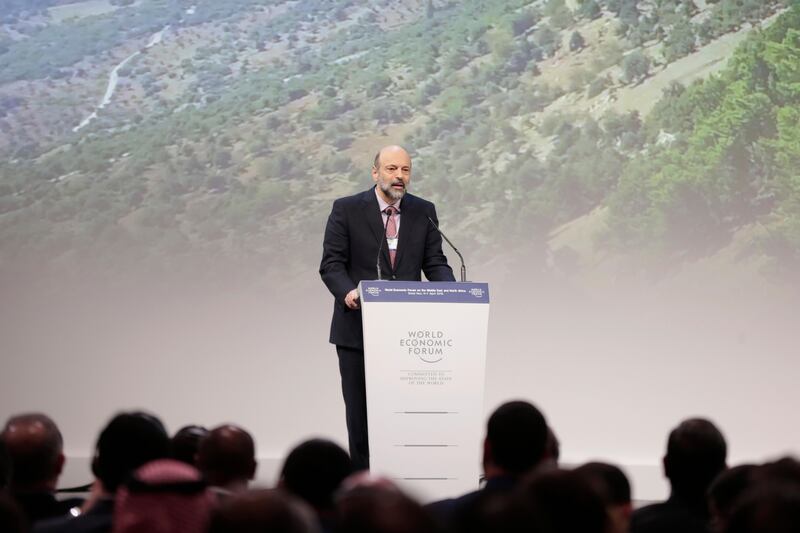Jordan hopes it can revive flagging economic growth on the back of reconstruction work in neighbouring countries including Syria and an oil pipeline with Iraq, the country's prime minister said on Saturday.
In an exclusive interview with The National at the World Economic Forum meeting at the Dead Sea, Omar Razzaz also said that the kingdom would not deviate from its belief that the only peaceful solution for the Palestinian-Israeli conflict includes a sovereign Palestinian state, with East Jerusalem as its capital.
“There are many plans, there are views, there are efforts…but for Jordan we’ve historically had a very clear position and we tend to think without that there won’t be lasting peace in the region,” Mr Razzaz said, referring to the long-mooted plan for peace developed by the administration of US President Donald Trump.
He also said Jordan’s relationship with Iraq is “at an all-time high”, mainly in economic terms but also on security co-ordination.
“Iraq did a great job in defeating ISIS. On the economic front whether it’s in trade, connecting our electricity grids, the oil pipeline and other sectors where Jordan can provide a lot of know how…there is a lot of progress that can be made,” Mr Razzaz said.
The financial burden of hosting 1.3 million Syrian refugees continues to weigh on the kingdom at a cost of $2.5 billion a year, the prime minister said.
Yesterday at the forum, UN Secretary-General Antonio Guterres delivered a passionate message, urging world leaders planning to attend the Climate Action Summit in September to show more urgency and ambition.
“I am telling leaders, don't come with a speech - come with a plan!" he said.
About 1,000 government and business leaders have gathered at the Dead Sea to work on a co-operative response to the biggest issues facing the Middle East and North Africa including skilling the region’s youth for future jobs, closing the gender gap and how to spur economic growth, as well as climate change and conflict resolution.
A high-level UAE delegation is in attendance including the Minister for AI, Omar Al Olama and Dr Thani Al Zeyoudi, the environment minister and co-chair for the meeting.
______________
Read more:
[ Jordan’s foreign minister says Donald Trump’s decisions risk more conflict in the Middle East ]
Also at the opening session of the forum were King Abdullah of Jordan and Muhammadu Buhari, the President of Nigeria. Mr Buhari said that his country was “open for business” and that the nations of Africa and the Middle East were natural trade partners.
He also stressed the need to address barriers to social and economic inclusion in order to tackle the threat of terrorism and radical ideology. Nigeria has made significant progress in battling the terror group Boko Haram and Mr Buhari said that today no territory is held or controlled by it in the country.
The event concludes on Sunday.








